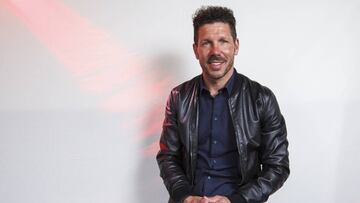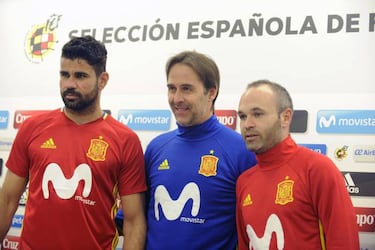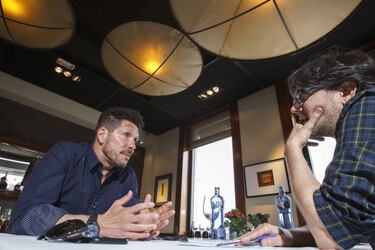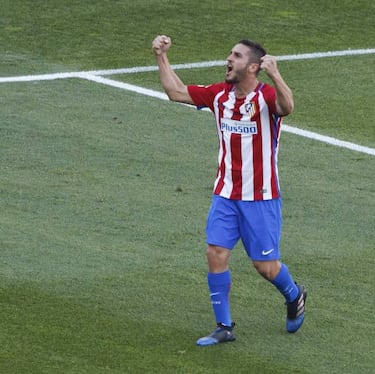Simeone: Costa was our Messi, he had to play in Lisbon
In part two of his interview with AS, Atlético Madrid boss Diego Simeone discusses strategy, identity and mentors - and those Champions League finals. Was Sergio Ramos given a tactics tip-off ahead of Milan</br><a title="Barcelona vs Deportivo La Coruña live online: LaLiga" href="https://en.as.com/en/2017/12/17/football/1513504209_061523.html">Barcelona vs Deportivo La Coruña: LaLiga</a>

In the first part of our interview with Simeone he talked about how being the coach of Atlético Madrid affects him, the pain of Lisbon and how he sees the players, Griezmann included...
Here's part two:
How have you led Atlético Madrid to the finest period in their history?
The most important thing is not standing still and admiring what we're doing. If you do that, you start to get carried away with yourself, to gaze at your own reflection too much, and then you end up getting yourself in a mess. And what has also brought us a lot of strength is stability.
Stability provided by the club?
Of course. There was a really good show of patience by the club in my first [full] season here. Atlético needed money and, despite that, held on to Falcao. And it wasn't easy. The club gambled, and it paid off. As a coaching team, he gave us a player who made us stronger and helped us win the Copa del Rey. Then Diego Costa emerged, and the pieces started to fall into place.

What do Atleti need to do to make the leap to occupy the same territory as Real Madrid, Barcelona or Bayern Munich?
To be honest, I don't think it's possible. You've named three clubs that are different to the rest, particularly because of the footballers they have. After that, the likes of Paris Saint-Germain, Manchester City and Chelsea have a lot of money, but they can't catch up with them either. Don't ask me exactly how, but their history sets them apart as more powerful in every area. To contemplate getting to that level, we'd need years more of what's happening to us now. Atlético have the 15th highest budget in Europe but compete in footballing terms. And it hasn't been enough to win the Champions League.
How did losing those two Champions League finals in 2014 and 2016 affect you personally?
Deeply, particularly the second. In the first, we'd just won the league title...
How has the team managed to overcome those two final disappointments?
Any other team that lost two finals in that way - other than Real Madrid, Barcelona or Bayern, clubs that are so used to playing finals - would have gone into decline. Time will bear out the importance of what we achieved. It'll be historic, legendary.
Did you make a mistake by starting Diego Costa in Lisbon?
If I had it all over again, he'd play the final from the start again. How could our best player not play?

Because he was injured?
He wasn't injured! Did you see the 100m sprints he was doing out on the pitch? I said: "If this lad can give me 45 minutes in the Champions League final..." It's Diego Costa! It's like [Leo] Messi being at 50% and not playing for Barça in the Champions League final. For us, Diego Costa was our Messi.
And a source of motivation for his team-mates...
But it's also worth pointing out that, having taken the risk I took, we took Real Madrid to the 93rd minute. I'd like to ask those who wonder about [what would have happened] if I'd done something [different]... And if I'd done something [different] and we hadn't even taken them to the 93rd minute? We lost two finals against Real Madrid, eh! Let's not forget that: they're 11-time European Cup winners.
And in the second final, might it be argued that you played for penalties when you could have gone all out to win the game?
No... The substitution was [Ángel] Correa for Saúl [Ñíguez]. [But before we could make it] we scored the equaliser. And so I didn't make the change. Bringing on Correa for Saúl would have either led to us scoring a goal or to us conceding a goal. We'll never know. The bolder among us say I bottled it; the more sensible among us say I got to penalties. It depends on which position you want to take.
Did you prepare for the Milan final at the Las Rozas training complex just outside Madrid?
Yes.

Are you aware of the rumour that Sergio Ramos found out Atlético's tactics because he knows the people who work at Las Rozas from training there with the Spain team?
I am aware of it, yes. Imagine how much of a mess they made of it if they needed penalties, then. They should have won 4-0.
So you don't believe it...
It's possible that it's true, I guess; but if they did know our tactics... [laughs]
Has everything already been thought of in football?
Sometimes you go backwards to look at previous styles that you can lean on, others you look for something new. But, above all else, nobody has the gospel truth. I think that, as coaches, we aren't very far away from each other in what we think about the game: it's just the paths we take that are different.
Is the current fashion for a 4-3-3 with a high press?
Yes, yes... For me, the clubs who best use the 4-3-3 are Barça, Madrid and Bayern. But that's because they have three forwards who end up resolving any situation you could imagine, whatever the system! You can say: "I'm going to attack with three up front", but if they create five chances and score just one goal, then watch out: because you're closer to losing than winning.
What is the fundamental Simeone idea?
I'm about not forcing players to do what the coach needs, but rather them feeling for themselves what the team needs. If you get a player to feel what the team needs, you're closer to making any system work well for you.
There's logic to that.
The other day, I gave the lads the example of [Mario] Mandzukic. We know him well. Right now he's playing on the right for Juventus in a 4-4-2 or a 4-2-3-1, but covering the whole flank. That speaks volumes for his intelligence as a player, because he sees that he's competing with [Paulo] Dybala, with [Gonzalo] Higuaín, and he wants to adapt to what the team needs. And the more players a team has who are committed and are more sensitive to what the team needs than to what they need individually, the better.
Do you think the concept of 'having the ball' is overrated?
It's the oldest debate in football! That's what it's all about, be it football, politics or religion: there's debate because there isn't only one way forward.
And what's your vision?
It depends on the team you have. Barça were the team who best represented having possession of the ball, but they had it to hurt you. Now, with the three that he has up front, Luis Enrique has changed the team's intentions, changed the team's speed. You have to keep teams fed with different ways to win. You have a plan A and a plan B because even if it's all easier and more natural with the first, there are times when it doesn't work.
Does it bother you that you're seen as a defensive coach?
No, no. It honestly doesn't. I believe that the better you defend in football, the better you're going to attack. I look at every game in every league, and I see goals. The team that manages to concede the fewest will be closer to winning.
Which coach had the biggest influence on you during your playing career?
I had a lot of very different coaches. I played under [Carlos] Bilardo when I was very young, when a coach is almost like a father or a mother to you. It was a period when my mind was opened up, when there were still people in Argentina who thought there was no other system beyond the 4-3-1-2, and in Europe they were changing players' positions. Who could have thought then that wingers could play inside out? Bilardo opened up all our minds.

And after that?
In terms of motivation, Coco Basile was extraordinary. He got the best out of players by tapping into them emotionally. Then there was [Sven-Göran] Eriksson, who had an innate ability to switch around the pieces in front of him and not get worked up about anything, whether it was a defeat or a positive result. His demeanour always remained the same...
At Lazio?
Yes, he was crazy about quick transitions. At the end of the day, football comes down to finding space when you're attacking and keeping them covered when you're defending. In that Lazio side, we had [Sinisa] Mihajlovic in central defence and [Juan Sebastián] Verón in central midfield. They were masters of the direct pass. And we had [Pavel] Nedved, [Marcelo] Salas, [Roberto] Mancini, [Fabrizio] Ravanelli... All very quick players. And with one or two passes we'd create dangerous situations. We didn't need to have the ball for long spells of possession. But it was a question of the characteristics of the players we had.
Is winning more important than how you win?
It bothers me that when you get to a final, [suddenly] nobody cares about the 'how'. It's only about winning then. Isn't it the same thing playing 'ugly' in a Champions League final and winning it, and picking up a whole load of points in the league to reach your objective? We all kid ourselves a little bit...
So you're more of a Bilardista than a Menotista?
No, I'm a Simeonista [laughs]. I'm somewhere in the middle. I'm neither one thing nor the other.
And what is Simeonismo?
I don't only play one way. I play in different ways even within a single match. The whole Cholismo thing is more a journalists' thing.

But is there something that defines the Simeone style?
It's down to others to define me. I'm a firm believer in passion, in people doing things because they feel strongly about them. To be a good motivator, you've also got to have good recipients. It's impossible to talk to the wall. I've been lucky enough to have had footballers who have always followed me. And today we are lucky enough to still have five lads who have followed us from the off: Gabi, Koke, [Diego] Godín, Juanfran, Filipe [Luis]...
Does that Atlético generation still have more in the tank?
I think the names I've just mentioned do, yeah. Because of how they train and how they work.
Has this season's Atlético team managed to play how you wanted it to?
Look, this time we have a young squad: Correa, [José María] Giménez, Saúl, Koke, [Antoine] Griezmann, [Yannick] Carrasco, [Jan] Oblak, [Stefan] Savic, Sime [Vrasljko], Lucas [Hernández], Thomas [Partey]... At other times, there were more experienced players: Diego Ribas, Miranda, Raúl García... I think we looked for what was best for the team and we found what you're seeing today.
But did you want Atlético to play a more attractive brand of football, leading to Koke's move into the centre?
Look, if you play with Koke there you have to go out to attack and score goals. If you attack and don't score the goals, then the going gets tough.
So?
Let me put it this way: I set out from the starting point of a 4-4-2. From there, it can become a 4-3-3, a 4-2-3-1, whatever you want. And I always have Koke in the midfield and to one side. But what happened is this: we lost Augusto [Fernández] to injury, and we didn't get Tiago [Mendes] back. It's possible that Saúl is the most suited to central midfield of the players left to accompany Gabi. If Tiago and Augusto had been fit, Koke would almost never have played in the middle. He's an option there, like when we beat Real Madrid, when I took out Mario Suárez and I put Koke in the middle.
Do you think the team is working better now it's more protected at the back?
For me, Koke's position as the third man in the middle is important for the team. He's far away from the right-back, he allows Filipe Luis the whole flank, and on the other wing you can almost play with a forward, because Gabi has something: he covers a lot of ground on the right-hand side of central midfield, and if I put Koke to his right I feel like they overlap. What I need there is a forward. I've tried it a thousand times with Correa, who did it very well at Valencia.
Who is your Simeone out on the pitch?
I'm lucky enough to have lads who follow me. And that is really important. The likes of Godín, Gabi and Koke are really important to me. Those three and Griezmann are, without doubt, the guys who set the tone for the team.
What's the best thing that Simeone has done at Atlético?
Related stories
That's a question for the fans.
And what's left for you to do?
What drives me is making this club greater. The only path that leads me to stay where I am is seeing that energy focused on improvement, seeing the body language that's still positive. What kills me is when I see people growing stagnant, people losing motivation.
A video of part two of our interview with Diego Simeone (in Spanish) can be viewed below.

